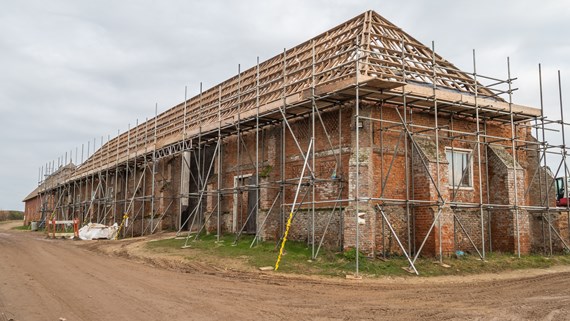Using standard form construction contracts
Insight

Construction contracts are often the least considered element of any building project on a rural estate, be that for a new bathroom block in the caravan park, the conversion of a steading to business units, or turning an old bothy into a holiday cottage. While contracts serve an essential purpose in delivering design and construction on time and on budget, negotiating them can be a time consuming and difficult process. Construction is complex and so too are its contracts.
To streamline the process, the construction industry has developed standard form contracts which can be purchased and used with relative speed and ease. The Joint Contracts Tribunal (JCT) publishes a suite of standard form building contracts and related contracts, such as collateral warranties, covering a range of scenarios and even a complete project pack. Specialist bodies such as the Royal Institute of British Architects (RIBA) and the Royal Institution of Chartered Surveyors (RICS), also publish standard form contracts for appointing consultants in their respective fields.
But do standard form contracts really work?
- Why use them? Standard form contracts are almost always immediately acceptable to the construction supply chain, without negotiation. This means they may be the quickest way of engaging a contractor or consultant, so will often be the best option when agreeing a contract rapidly is more important than the actual terms of that contract. Standard form contracts should also comply with the current law (although this is not always the case).
- Why not use them? The price for expedience may be legal accuracy, as standard form contracts cannot hope to cover every possible circumstance in the same way as a negotiated contract. Further, their one-size-fits-all approach may not be appropriate to the peculiarities of a project on a rural estate, such as off-grid services. More seriously, some construction law commentators would say that standard forms are favourable to the supply chain, against the interests of the client. That may appear subjective, but there is in fact some objective evidence for it: previous editions of the RIBA terms have been criticised by courts for being unfair to consumer clients. Perhaps for this reason, lenders are often reluctant to accept standard form contracts.
The most legally secure practice is to adopt a halfway house between standard form contracts and fully bespoke contracts, and to appoint professional consultants using bespoke terms and appoint the building contractor using an amended version of the JCT contract terms. This will be the better option on more complex or valuable projects which justify some legal spend and may be the only option on bank funded projects, or where there is an institutional purchaser or tenant which requires particular assurances. Most consultants and contractors will be receptive to bespoke terms where there is a good business need, or where the bespoke documents are discussed at the outset. The problem with them is that they can create delays because contractors and consultants will need to consult their insurance and legal advisers to ascertain that the new terms will not vitiate their insurance arrangements and are not unreasonable.
Where you choose to use a standard form contract, how can you get the best out of them?
- Avoid mistakes: be careful filling in gaps in standard form contracts and choosing optional clauses. At the risk of pointing out the obvious, correctly completing the contracts is critical. Some of this information will be more obvious than others: although the name of the contracting parties in a RIBA contract is a simple matter, the application (or otherwise) of the Joint Fire Code in a JCT contract is a challenge which many professionals struggle with. The selection and deselection of optional clauses can also radically change the commercial effect of a contract. For example, one of the insurance options in the standard form JCT contract requires the client to ensure that all existing structures are insured in the joint names of the landowner and the contractor. If this creates an inconsistency between the insurance stipulated by the contract and the insurance arrangements actually put in place, the client may be liable for the shortfall.
- Arranging insurance: as above, it is important that the correct insurance policies are put in place. One requirement which is often overlooked on residential schemes is the New Homes Warranty. A New Homes Warranty is a form of insurance against latent defects in the completed works, enabling a purchaser to recover the cost of remediating defective works. Although a New Homes Warranty is not currently a strict legal requirement, it may be necessary for a purchaser to have one before they can obtain a mortgage. It is also expected to become a legal requirement within the next few months.
- Regulatory matters: a recurring theme in recent legislation has been to impose increasing legal duties on the construction client, not just the contractor, on the (sometimes faulty) assumption that the client is in the best position to influence outcomes. The Construction (Design and Management) Regulations 2015, for example, impose health and safety obligations on all project participants, including the client, and these are enforced by criminal prosecutions by the health and safety executive. More recently, the Building Safety Act 2022 (BSA) has imposed a new regulatory framework for the construction and maintenance of buildings. It imposes duties not just on contractors, but also on their clients (as the new buildings’ owners) to comply with the standards set out in the BSA. This means that clients can now have claims brought against them directly if the building is not compliant. What this means in practice is that, whilst it is all well and good for the contract to provide that the contractor will comply with Building Regulations, it still might be worth the client checking that someone has actually applied to the local authority for the relevant approvals.
In summary, best practice in contracting depends on the size and nature of the project. Whilst legally imperfect, standard form construction contracts are a reasonable solution for certain smaller projects; they are a quick and efficient way of contracting on terms which are generally functional. They will not, however, be appropriate for more complex or valuable schemes. This applies in particular to bank funded projects, where the additional expense of contracts advice (either to advise on and actively amend standard documents, or to create fully bespoke ones) will be more justified.
If you require further information about anything covered in this briefing, please contact Edward Banyard Smith or your usual contact at the firm on +44 (0)20 3375 7000.
This publication is a general summary of the law. It should not replace legal advice tailored to your specific circumstances.
© Farrer & Co LLP, February 2023






